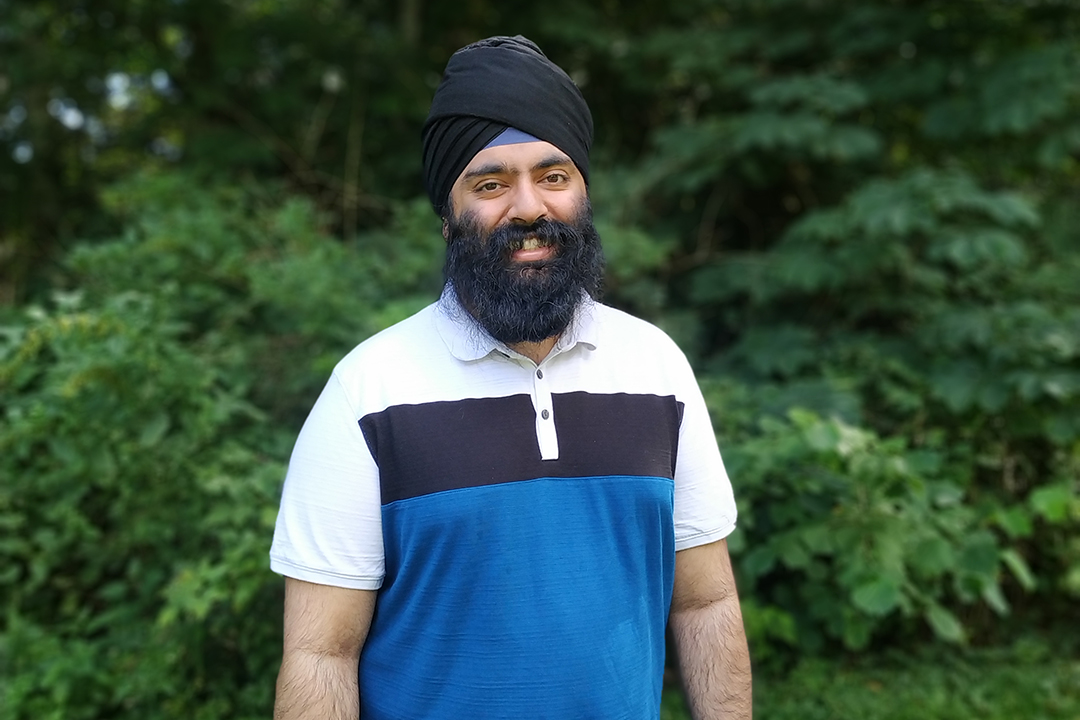
BBC nature films inspire student’s vet ventures
First-year veterinary student Kabir Dhadda distinctly remembers the moment he found out that he had been accepted to the Western College of Veterinary Medicine (WCVM).
By Lynne GunvilleIn fact, he had been imagining the moment for so many years that he actually had a planned procedure for opening his “decision letter.” He moved to a quiet place, took a few breaths, closed his eyes and opened the document.
“I wanted to try and savour it, for such moments can often be rare in life, and this was definitely one of them,” says Dhadda, who started classes at the WCVM in August 2020. “I had imagined the first words being, ‘Congratulations, you have been offered ...,’ and fortunately for me that was what I read when I opened my eyes!”
During his early childhood in the United Kingdom, Dhadda had no direct involvement with animals, but he loved watching the BBC documentaries of Sir David Attenborough with their focus on the Earth’s animal and plant life.
Dhadda and his family moved to Canada when he was in elementary school; as a result, he grew up within two different cultures — an experience that shaped many facets of his personality and views. He was also greatly influenced by his Sikh faith which is an integral part of life for him and his family.
Although Dhadda had always known he had a natural affinity for animals, he was in high school when he realized that a veterinary career would enable him to connect with animals and people and fulfil what he considered to be humanity’s greatest purpose: serving life itself.
With his sights firmly set on a veterinary career, Dhadda concentrated on academics at the University of Alberta (U of A) while he completed a Bachelor of Science in Animal Health degree. He also began seeking opportunities to gain knowledge and practical experience that would open doors in the field of veterinary medicine.
In addition to volunteering at several veterinary clinics, Dhadda volunteered at B.C.’s Urban Safari Rescue Society where he enjoyed the chance to work with different species including tarantulas, snakes, lizards, exotic birds and snapping turtles.
“It felt like I reverted to my young childhood years, waiting eagerly for the next BBC nature documentary,” says Dhadda who was particularly fond of his interactions with the tortoises. “After my experiences at Urban Safari, I had gained a much deeper appreciation for animals.”
Dhadda also got the chance to obtain research experience when he received a Natural Sciences and Engineering Council of Canada (NSERC) undergraduate summer research award at the U of A, a position that would eventually lead to his pursuing a Master of Science degree. In 2019 the Canadian Dairy Commission awarded him a scholarship to fund his graduate research that focused on developing a probiotic formula to help mitigate calf scours.
It was an exciting challenge for Dhadda who welcomed the chance to address a major cause of morbidity and mortality in calves. He successfully sequenced the full genomes of numerous gut bacterial species and genetically determined their potential as a bovine-derived probiotic. He was also able to identify specific bacterial species that had not previously been found in dairy calves.
Dhadda particularly appreciated the support of his U of A graduate supervisor Dr. Leluo Guan, who encouraged him to explore new ideas, analyze and develop scientific questions and then apply research in new, creative ways.
“I have come to find my approach to life has become synonymous with how I approached research challenges," explains Dhadda. “Things such as studying the problem thoroughly, developing a hypothesis, designing an experiment and implementing it ... the development of a logical framework to approach problems has been immensely rewarding for me personally.”
Now that Dhadda is a WCVM student, he’s enjoying the practical labs, and he views their assignments involving anatomy, animal handling and surgical skills as opportunities for him to hone his craft.
When he considers his future after graduation, Dhadda can see himself working in small animal medicine, research or public health — three fields that represent his key areas of interest.
Whatever path he chooses, Dhadda looks forward to pursuing a passion that will continue to motivate him throughout his career.
“During my volunteer experiences in veterinary clinics, it became apparent to me that a veterinarian is more than just a professional who treats animals. He is often an adviser, a leader and a detective — among other things,” says Dhadda.
“My experiences working with an array of animals in a number of different capacities have just made me more excited to work in the field of veterinary medicine.”
